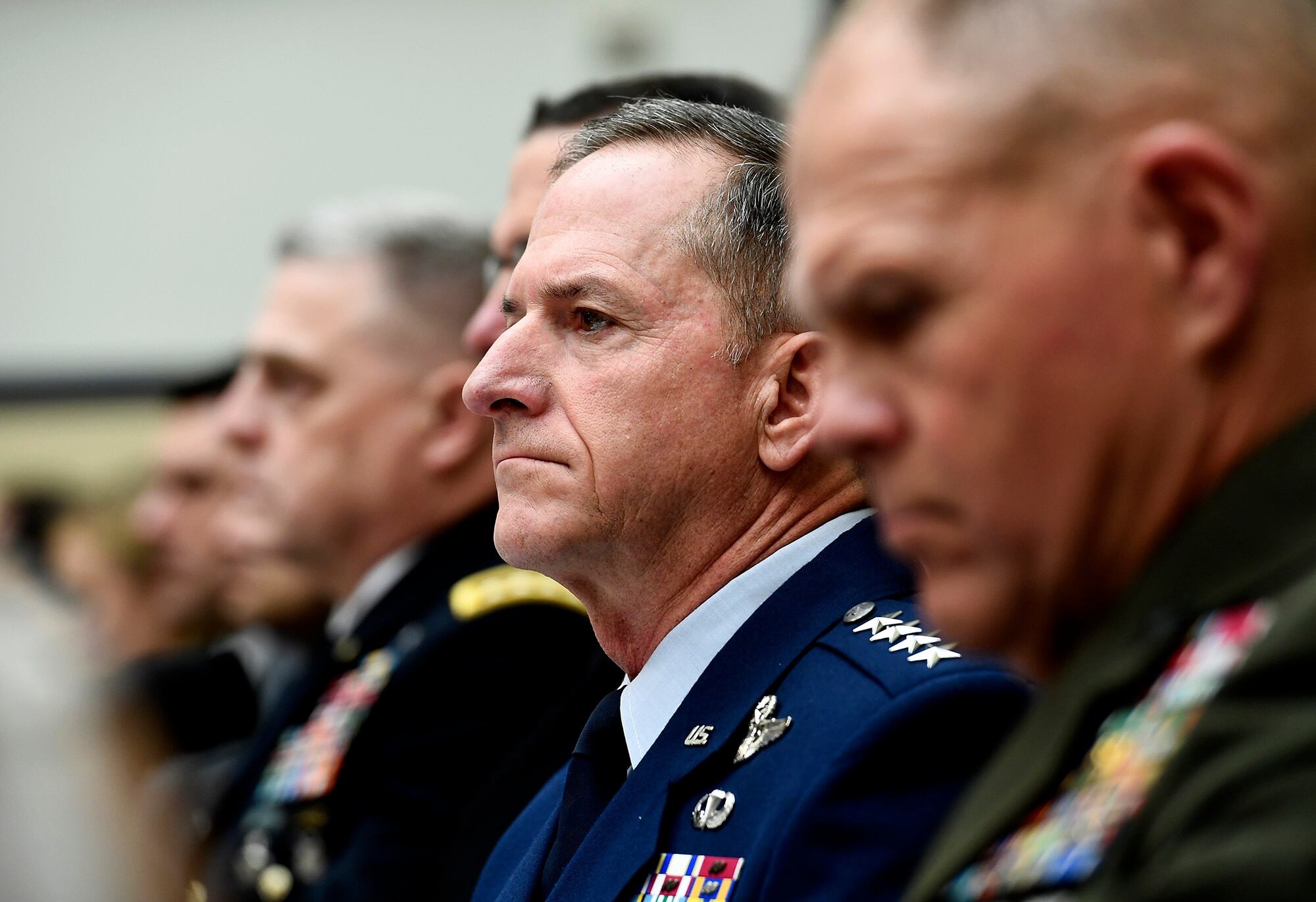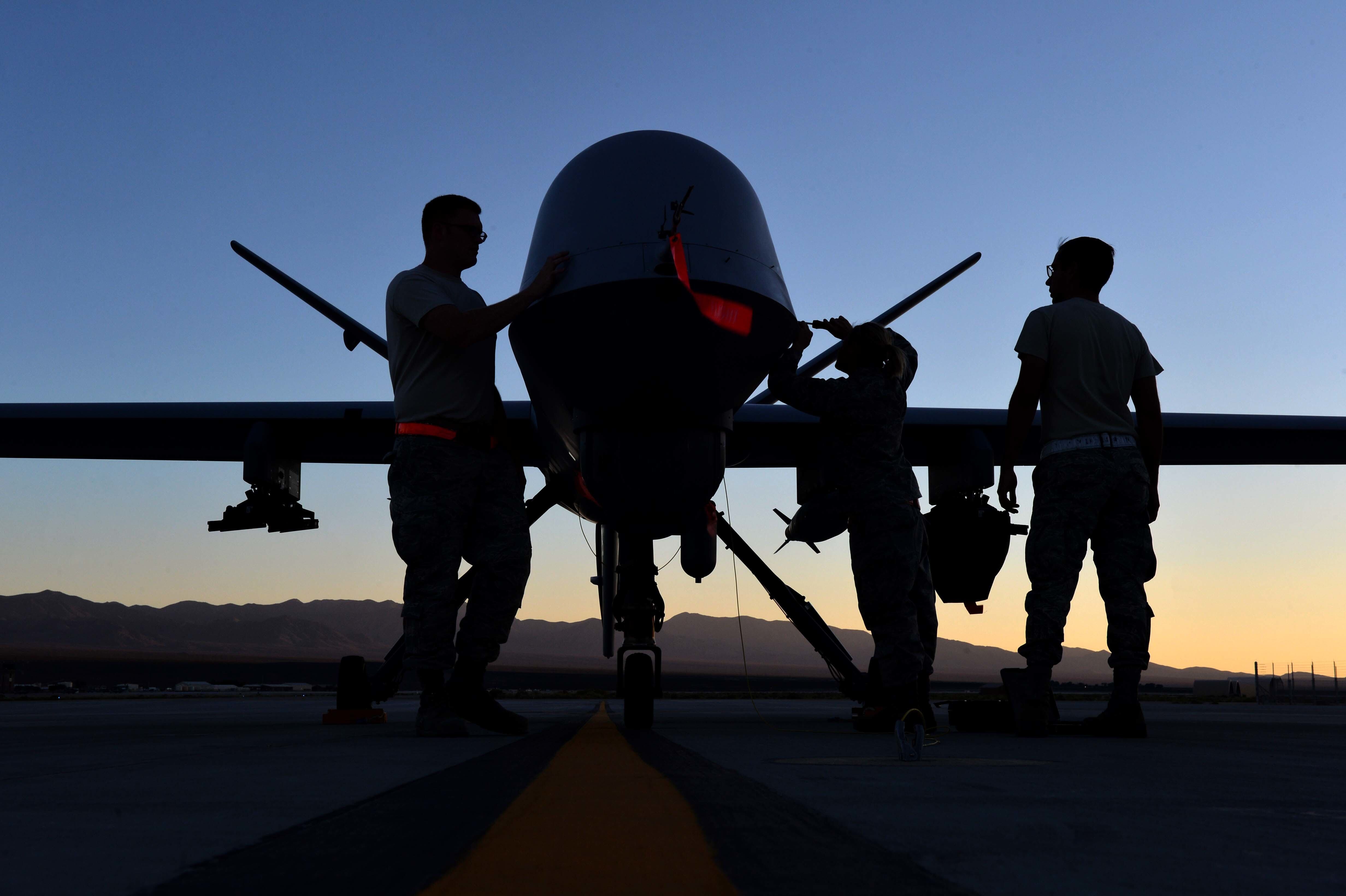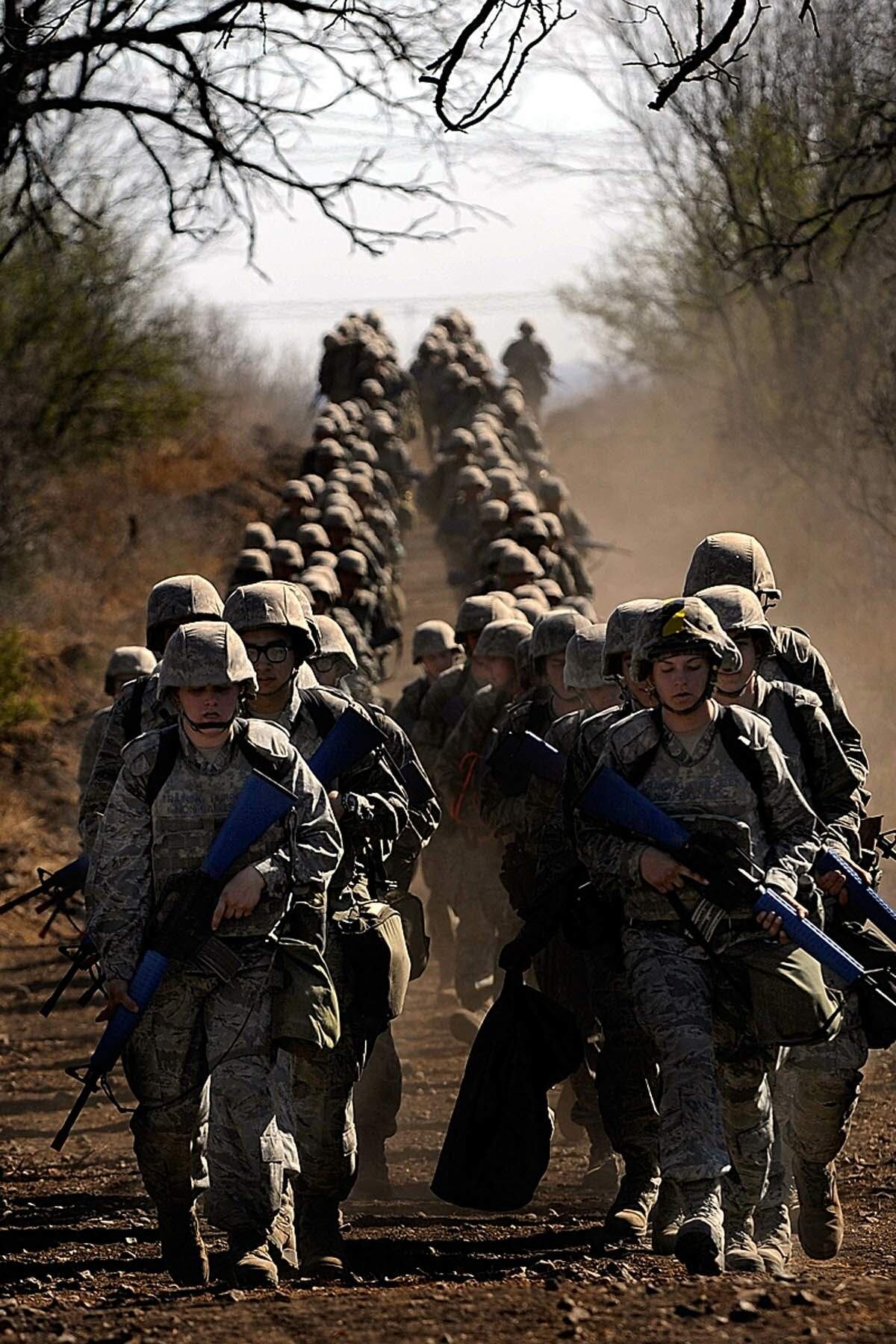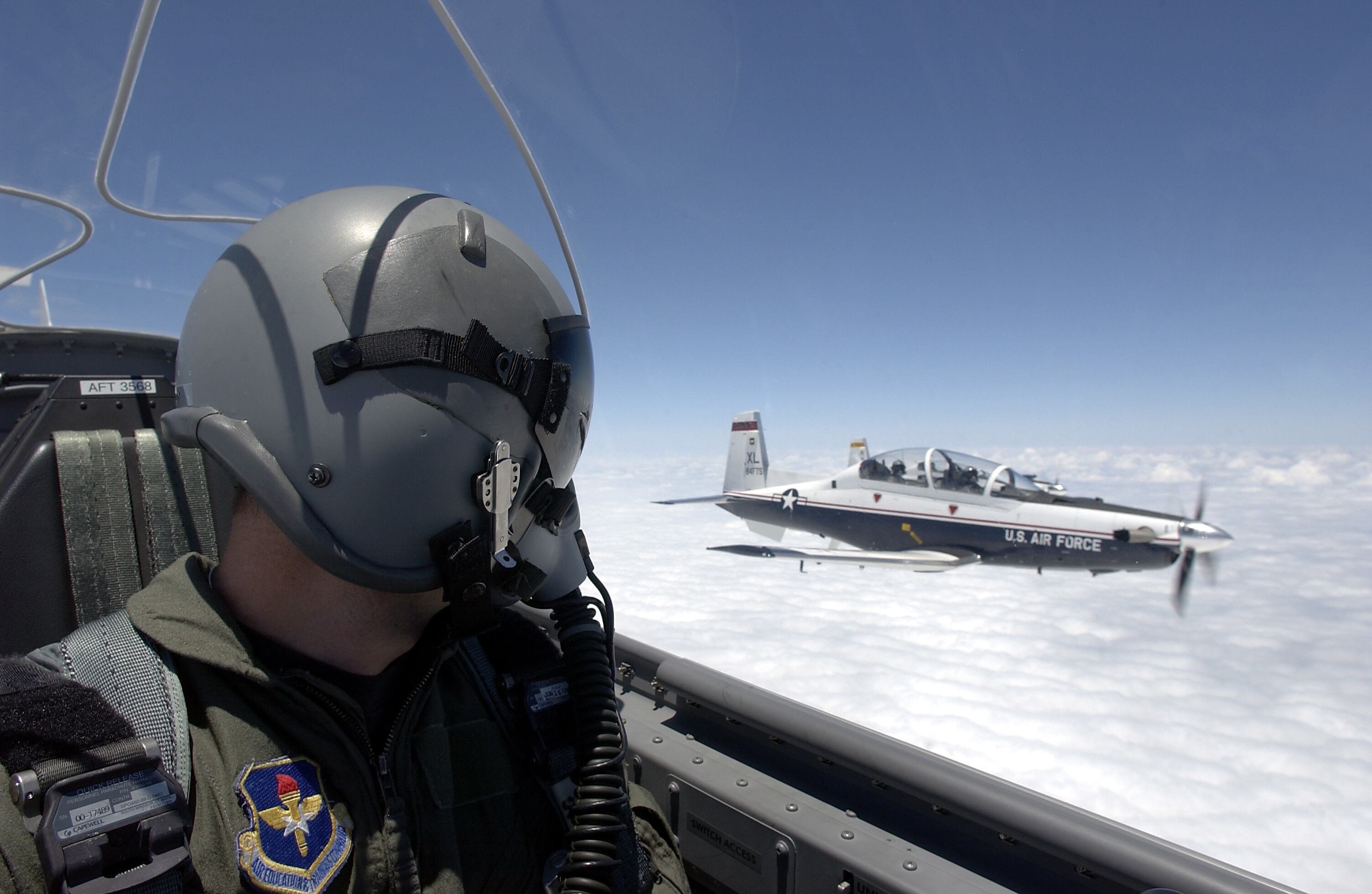Squadrons across the Air Force will be grounded. Moves will be put on hold, throwing families into turmoil.
New recruits won't be able to start basic training. Bonuses for critical personnel could be deferred.
And that's just the beginning.
More than halfway through fiscal 2017, Congress still hasn't gotten its act together enough to pass a budget that funds the Air Force and other government agencies.
If that doesn't change soon, it's going to start screwing things up for tens of thousands of airmen across the country.
The Air Force, along with the rest of the government, has been operating all year under a continuing resolution that — with a few small exceptions — keeps funding the service at fiscal 2016 levels.
But to meet its global national security commitments, the Air Force has had to fly at higher levels than last year, said Col. Patrick Ryder, an Air Force spokesman. The service took the risk of assuming a 2017 budget would be passed, "which is a reasonable expectation," he said.
Continuing resolutions, or CRs, are intended to be short-term budgetary measures to keep the lights on while lawmakers work out the last details of the budget.
But as partisan rancor has increased over the years and Capitol Hill has gotten increasingly gridlocked, operating under CRs for months at a time has become standard practice.
And time is running out for the current CR, which expires on April 28.
It’s possible that, after passing a short CR extension to buy another week or two, lawmakers could compromise and fully fund the government for the last five months of the fiscal year.
Or Congress could punt, decide to give up on 2017, and make do with a full-year continuing resolution for the Defense Department. If that happens, it would toss an entire range of new problems in the military’s lap, senior leaders warned.
Budget expert Stan Collender, a former staffer on both the House and Senate Budget committees, said April 10 that, out of all agencies, the Defense Department is probably least likely to face a year-long CR. But, he said, with Democrats firmly opposed to the Trump administration and House Republicans in the Freedom Caucus proving they’re willing to buck their party’s president, anything is possible these days.
"Given what’s just happened with [the Trump administration’s failure to pass a] health care [bill], I’m not sure that anything is probable or predictable anymore — particularly when it comes to anything having to do with taxes or spending," Collender said. "This could be the equivalent of a clown show that could end up shutting down the government."
Chiefs speak out
In an April 5 House Armed Services Committee hearing, it became evident that the Joint Chiefs’ patience with inaction on Capitol Hill is running out fast.

Air Force Chief of Staff Gen. Dave Goldfein and the other service chiefs testified April 5 on Capitol Hill about the impacts of operating under a year-long continuing resolution.
Photo Credit: Scott M. Ash/Air Force
Army Chief of Staff Gen. Mark Milley’s frustration was palpable when he rejected one lawmaker’s suggestion that operating under a constant continuing resolution has become "the new normal."
"Candidly, failure to pass a budget, in my view, … constitutes professional malpractice," Milley said. "The world is a dangerous place, and it’s becoming more dangerous by the day. Pass the budget."
Air Force Chief of Staff Gen. Dave Goldfein laid out to lawmakers in stark terms how damaging a full-year CR could be to the service.
It would cost the Air Force $2.8 billion the rest of the year, and it would be "the equivalent of a mini-sequestration round, which we have already been through before," Goldfein said.
"In the Air Force, we still haven’t recovered from round one" of sequester budget cuts, he said.
The most dramatic development would come in late July, when all squadrons that are not deployed or training for imminent deployment will stop flying.
(Goldfein told lawmakers that planes would stop flying in late June, but the Air Force later said he misspoke.)
"You will have the equivalent of a no-fly zone over your base," he said, unless a unit is preparing to go into conflict.
This means Air Force-run exercises like Red Flag — in which U.S. and allied pilots practice air-to-air combat at Nellis Air Force Base in Nevada — would be cancelled, Goldfein said.
Other exercises run by combatant commands can’t be cancelled by the Air Force, Ryder said, but the service would likely scale back its participation.
"They will not fly, because the money is not there to fly," he said.
'It'd be devastating'
Ryder said the Air Force will have to make "hard choices" to prioritize deployed or deploying squadrons and ensure the service can continue waging war on the Islamic State group.
Goldfein stressed to lawmakers that airmen getting ready to go into combat overseas will keep practicing to avoid any degradation in their skills. But, over time, grounding squadrons will have an effect, Goldfein and Ryder said.
"How long will you be able to operate under that kind of situation if, on the back end, you’re not able to bring on new pilots, bring on new recruits, train those recruits, go through the exercises?" Ryder said. "Eventually, there will be a degradation in your ability to conduct operations around the world. … When you start to back things up, you need to be able to train those pilots, you need to be able to have those kinds of exercises that are required to ensure that the long-term sustainment of our force is maintained. Exercises like Red Flag, Green Flag, we’ll have to look at all of those."

Airmen from the 432nd Aircraft Maintenance Squadron work on an MQ-9 Reaper before Red Flag 16-3 at Creech Air Force Base, Nev. Air Force exercises like Red Flag could be canceled if Congress keeps the service on a continuing resolution, leaders said.
Photo Credit: Airman 1st Class Kristan Campbell/Air Force
And there will be repercussions long after the groundings are technically lifted, said Lt. Gen. Mark Nowland, deputy chief of staff for operations, on April 12.
"It’d be devastating," Nowland said. "Airplanes, when they sit, what do airplanes do? They break. So, when you bring everybody back, we’ve got to fix the airplanes."
It doesn’t stop there. Pilots who don’t fly fall out of practice and start to lose their currency quickly. For example, within 30 days, a grounded pilot starts to lose currency in basic skills such as takeoffs and landings, Air Force spokeswoman Erika Yepsen said.
To regain that currency, that pilot has to fly with an instructor pilot. But if the instructor pilots themselves are grounded and lose their currency, they can’t help other pilots regain their currency.
A backlog will grow as the few instructor pilots remaining current are stretched thin trying to recertify the rest of the force.
"The longer our pilots are out of the cockpit, the more currency they will lose," Yepsen said.
Nowland said this means that a halt in flying that would, on paper, last a month to six weeks would in reality stretch into an eight- or nine-week break.
Retraining and recertifying pilots would cost the Air Force about 120 pilot trainee slots at a time when it produces only 1,200 new pilots per year — about 10 percent of its capacity, he said.
An experienced C-17 pilot must perform at least one takeoff, landing and instrument approach per month in an airplane to remain minimally current, athough pilots could meet other requirements by flying in a simulator, Yepsen said. But an inexperienced F-16 pilot would need to fly up to 10 sorties per month to maintain basic currency.
'Stress on families'
Even more problems would probably start to crop up sometime this summer.
All operational, unit and training permanent change-of-station moves for 13,000 families — those in the continental United States — would be put on hold until fiscal 2018, Goldfein said.
This would create a severe training backlog and leave positions across the Air Force vacant, he said.
Halting those moves also would create significant problems for affected families, he said.
Because the fiscal year starts Oct. 1, that means they wouldn’t be able to move until well into the school year, making an already-tumultuous transition even harder for kids.
Delayed PCS moves also upset airmen’s plans for child care and other family members’ jobs, Goldfein said, severely degrading their quality of life.
"That puts a stress on our families that actually can’t be quantified," Goldfein said. "Quite frankly, it’s breaking faith with our airmen and their families."

Without a budget, the Air Force could be forced to stop shipping new recruits to basic training. Here, basic trainees march in two columns after a training session at Joint Base San Antonio-Lackland Air Force Base, Texas.
Photo Credit: Master Sgt. Cecilio Ricardo/Air Force
The Air Force’s efforts to rebuild undermanned portions of its end strength would also be derailed.
More than 2,000 young men and women who have signed up to join the Air Force would not be able to enter and start basic training, Goldfein said.
"They have given up jobs, left home, made plans, all to be told they will have to wait now for months to pursue their dream," Goldfein said. "How many of these talented young men and women won’t wait, and will choose an alternative path, when we desperately need to grow our force?"
Hurting readiness
Goldfein also said it would hurt the Air Force’s ability to build up the force in new and growing mission areas such as remotely piloted aircraft, cyberspace operations, intelligence, surveillance and reconnaissance, and nuclear command, control and communications.
The Air Force has also been struggling to close significant shortfalls in its aircraft maintenance career fields and pilot ranks — especially fighter pilots.
This will be jeopardized if the funding problem isn’t fixed, Goldfein said.
Bonus payments across multiple career fields would be deferred, he said — including the up-to-$35,000 per year Aviator Retention Pay bonus that is a cornerstone of the Air Force’s efforts to hold on to valuable pilots.
It costs $11 million to produce a pilot who can fly a fifth-generation fighter like the F-22, Goldfein said, and the active-duty fighter pilot shortage is expected to exceed 1,000 by the end of this year.

A T-6A Texan II pilot flies in formation with another T-6A over Laughlin Air Force Base, Texas. If the Air Force is forced to ground its aircraft, it won't take long for pilots to lose their currency.
Photo Credit: Tech. Sgt. Jeffrey Allen/Air Force
And to plug the $2.8 billion funding hole, Goldfein said a lot of depot maintenance on planes such as the A-10 will have to grind to a halt.
Ryder also said that funding shortfalls will make it harder to get new spare parts and other equipment necessary to do the work.
The halting of maintenance work will have repercussions that reverberate down the line.
"When we get appropriations, it’s not like you just start the line back up immediately," Goldfein said. "Because all those workers that have left, we haven’t been able to hire their backfill, and they’ve lost their qualifications. So, there’s going to be a spin-up time at the end when we get an appropriation, to get those lines back up and running. … So, while I could buy all the parts in the world [after a full budget is passed], those parts will sit on the shelf because I don’t have the workforce I need to put those parts in the airplane."
This will also worsen a backlog of aircraft awaiting maintenance, he said, especially as aging airplanes that have been flying and fighting hard come in for their necessary inspections and repairs.
"It continues that backlog over time, and what you end up doing is grounding aircraft," Goldfein said.
All of this — if it comes to pass — will only serve to worsen the Air Force’s readiness and retention problems.
"Pilots who don’t fly, maintainers who don’t maintain, air traffic controllers who don’t control will not stay with us," Goldfein told lawmakers, repeating a frequent refrain of his.
Rep. Martha McSally, R-Ariz., a former A-10 pilot, expressed exasperation at the situation.
"We’re 1,000 fighter pilots short," McSally said. "And you’re grounding pilots. And we’re expecting them to stay. That’s insane. You agree?"
"Yes, ma’am," Goldfein replied.
Stephen Losey is the air warfare reporter for Defense News. He previously covered leadership and personnel issues at Air Force Times, and the Pentagon, special operations and air warfare at Military.com. He has traveled to the Middle East to cover U.S. Air Force operations.









